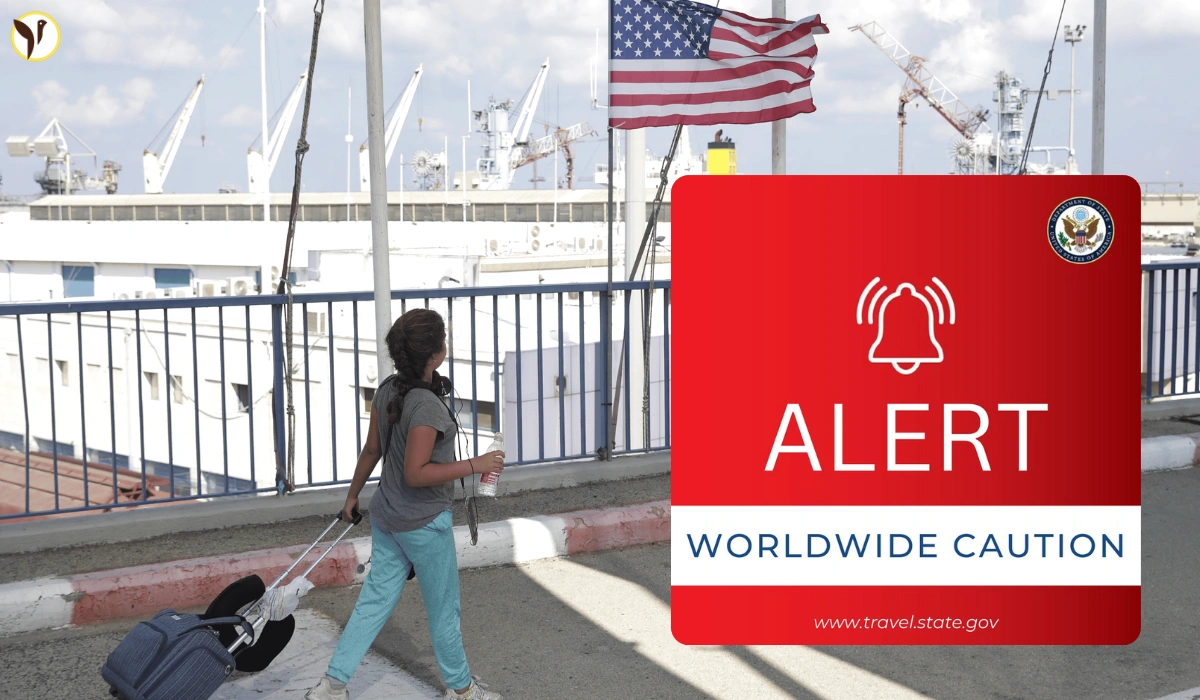The U.S. State Department just issued a global travel alert urging a heightened sense of vigilance, especially in reference to recent strikes involving Israel and Iran. It seems to more come out of nowhere, like one minute you’re just planning your trip, and the next minute, you have a global cautionary banner flying over your head. They would like all travelers, especially American travelers, to be even more acutely aware of their surroundings—even in destinations that feel entirely safe.
This isn't just about the Middle East anymore, and even very distant destinations with large Middle Eastern communities—like Canada, Germany, or Australia—are referenced. Like why? Well, maybe some side demonstrations or remote anti-U.S. sentiment. And what about flights? Flights are already being diverted or cancelled, too. Travelers are being warned to have emergency documents in order, verify travel insurance, and pay attention to local news wherever they are traveling.
What the Alert Means for Travelers – And Why It’s Serious
There may be some folks who dismiss this—thinking of it as just another alert. Well, I will say:
- Alert cites everywhere, and not just hot spots.
- Alert cites flight issues: re-routes, delays, and cancellations.
- Alert cites likely protests or gatherings that also catch you off guard.
- And there is quite a bit of attention paid to cyber threats, such as ATM freezes and hacking vulnerabilities.
I don’t mean to cause worry but you can’t ignore it. Even a city that seems “normal” could have tension sparks. Oddly enough, there’s no guarantee it could come from diaspora communities expressing support, or from a local reaction you did not expect. And for airlines, it’s an alert, a giant red alert—they have already restricted flights to Dubai, Doha, and Tel Aviv, so yeah, your plans could go south quickly.
ALSO READ: Israel Hamas Peace Deal: Agree for Ceasefire & Hostage Release
Fresh Info No One’s Talking About
I’ve found a few things that others haven’t really highlighted:
- Travel insurance increase: Some underwriters are increasing prices overnight for trips being booked through Europe or North America. They are not just worried about conflict but also the resulting backlash from protests in the country.
- Event cancellations are happening: Conferences in neutral countries that are reputable, are all secretly being postponed or moved. Organizers are worried about protests near venues.
- Local currency spikes: In places where there are active diaspora populations, such as Montreal or London, exchange rates have moved 2–4% in a single day, due to exorbitant demand from people trying to send money home.
- Document prep: Best practice now is to keep photocopies of your passport and insurance off line—either printed or on a USB as cellular networks and airports servers could go down.
I feel like all these small factors could mess with your trip even when you’re being careful.
Real Voices from Travelers
Look, hearing people talk about what they saw makes this real:
TravelGov on X (Twitter) posted:
“Worldwide Caution: The conflict between Israel and Iran has resulted in disruptions to travel and periodic closure of airspace across the Middle East…”
Due to the potential for terrorist attacks, demonstrations, or violent actions against U.S. citizens and interests, the Department of State advises U.S. citizens overseas to exercise increased caution. We are aware of the increased potential for foreign terrorist… pic.twitter.com/6aXW4CAJoa
— Travel - State Dept (@TravelGov) May 17, 2024
That line from the official was simple but chilling—“periodic closure of airspace.” It means flights you're counting on might just... vanish.
A tourist in Germany sent this:
“Saw a protest this morning with flyers against the US. It felt tense, even though it was peaceful. Didn’t expect it back home.”
And from Dubai, someone said they had to switch hotels last night after their insurer flagged “unrest risk.”
These aren't crime stories—they’re real people feeling caught in a bigger storm.
What You Should Do If You're Traveling Soon
If you’ve got a trip coming up, here’s a quick checklist:
-
Enroll in STEP (Smart Traveler Enrollment Program) to get updates.
-
Monitor local news—not just national headlines, but city-level.
-
Avoid large gatherings or political events.
-
Backup your documents offline—passport copies, insurance, emergency contacts.
-
Confirm insurance coverage—make sure it covers cancellations, evacuations, cyber risks.
-
Have a Plan B—know alternate routes, hotels, flights, or even ports if you're cruising.
It might feel a bit much, but better safe than caught off-guard, right?
Why This Warning Matters Even If You’re Not in the Middle East
You might think, “I’m going to Spain—how does this affect me?” But listen:
-
Diaspora reactions happen everywhere—big cities with many immigrants might see solidarity protests.
-
Flight disruptions domino—airlines avoid certain airspaces, and that messes up schedules worldwide.
-
Tech stuff gets hit—airports, ATMs, travel apps can glitch if something’s targeted by cyberattacks.
So yeah, if your flight home is routed through Doha or you’ve got a Euro-trip lined up, this could slow you down in ways you didn’t plan for.
Signs You Might Want to Change Plans
It might be time to hit pause if:
-
Your destination has major diaspora protests.
-
Your hotel is near a central demonstration zone.
-
Your flight path goes through Gulf airspace.
-
Your travel insurance doesn’t cover cyber or evacuation.
In those cases, consider postponing or rerouting. No shame in playing it safe.
What’s Next?
-
Watch for updated advisories—things are moving fast.
-
Stay tuned to embassy alerts—some countries might put in extra travel restrictions.
-
Keep tabs on major events—there’s a chance large conferences, sports, or cultural gatherings could be hit.
We’re in a moment where global tension can tilt your plans with zero warning. It’s not meant to stop travel—it’s a caution light. Just be smart, stay alert, and keep your options open.










